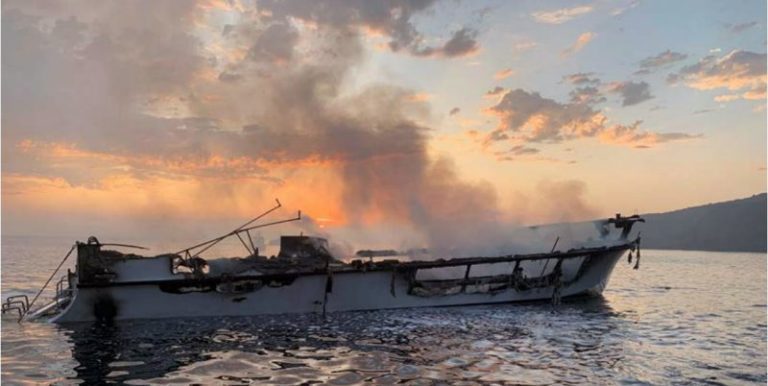The US Coast Guard, which is being sued by families of victims of the Conception diving liveaboard fire of September 2019, has announced new interim fire-safety rules for small passenger vessels that offer overnight accommodation.
The regulations come more than a year after a review was demanded by the US Congress in December 2020, and will be phased in from the end of March.
The legislation, part of the National Defence Authorisation Act directed by US Homeland Security, came in the wake of the overnight blaze that killed 34 people, mainly scuba divers, off Santa Cruz Island in the Pacific off southern California. Fishing boats and ferries are excluded from its scope.
The new requirements, which fall under eight general headings, directly address criticisms made of the Conception’s owner-operator Truth Aquatics after the disaster.
They include provision of fire-fighting and evacuation training programmes for crew, and of interconnected fire-detection and suppression equipment in all areas accessed by both passengers and crew. Detection and suppression systems also have to meet stricter standards than before in unmanned areas containing machinery or with other potential heat sources.
Monitoring devices must be installed and used to ensure that a regular and effective night-watch is carried out. There should be no fewer than two independent escape routes for all areas accessible to passengers, and these must be unobstructed and not positioned directly above a berth, as was the case on the Conception.
Passenger evacuation drills should be carried out, with all guests provided with plans showing emergency exit routes. And of particular significance are new regulations covering handling, storage and operation of flammable items.
Operators will be required to observe approved procedures for handling potentially risky procedures such as charging of lithium-ion batteries for cameras, torches, DPVs, phones and other equipment of the sort commonly used by scuba divers.
Responsible
The Coast Guard has long been responsible for inspecting small boats in the USA, including dive charter vessels. Last September Divernet reported that the service was to be the subject of a lawsuit in connection with the Conception tragedy.
Families of the victims, who have united under the banner Advocacy 34 to push for legislative changes, claim that the Coast Guard failed to enforce its own previous requirements concerning boat safety, and that certification of non-compliant vessels had grown “commonplace” over decades.
Also being sued for wrongful death and negligence is Conception owner-operator Truth Aquatics, while the boat’s captain Jerry Boylan is on bail on 34 criminal charges of “seaman’s manslaughter”. He and all but one of the crew escaped the inferno. They had been asleep on the top deck while the other crew-member had been sleeping below in the bunkroom with the 33 passengers when they were trapped by the fire and overcome by smoke.
The US National Transportation Safety Board (NTSB) found that Truth Aquatics and Boylan had failed to comply with Coast Guard regulations and provide effective oversight of the vessel and crew.
In the absence of a night-watch or provision of smoke-detection equipment in all accommodation spaces, the fire had grown undetected in the area above the sleeping quarters into which both exit routes led. The inadequate emergency-escape arrangements from the bunkroom were said to have contributed to the high loss of life.
Violation
The lawsuit against the Coast Guard maintains that while electrical wiring, fire-detection and suppression systems and the passenger accommodation escape hatch had all been in “open and obvious violation of federal regulations”, less than a year before the incident the Coast Guard had certified Conception as fit to carry 40 passengers on overnight trips.
The NTSB confirmed that the fire had originated in the area where li-ion batteries were being charged, although this could not be confirmed as the cause of the fire.
A Los Angeles Times investigation revealed that the Conception was one of some 325 small passenger vessels built before 1996 that the Coast Guard had exempted from tightened safety standards applicable to newer boats. Conception was 40 years old, and according to the Times the Coast Guard had ignored repeated calls from the NTSB to extend these measures retrospectively. The service has made no comment on the impending legal action.
Details of the new regulations can be found here.


All liveaboard divers should make sure a ‘muster practise’ take places also that alarms can be heard in their cabins when the engines are running and the general evac procedures. I spent a week in March 2020 aboard the Galapagos Sky, a fellow diver pointed to a life raft and asked what is that, I then realised we had been told where to muster but not heard the alarm. When I queried this it turned out the alarm wasn’t working. Normally I would ask as I am a instructor who has wrked on liveaboards in Thailand.